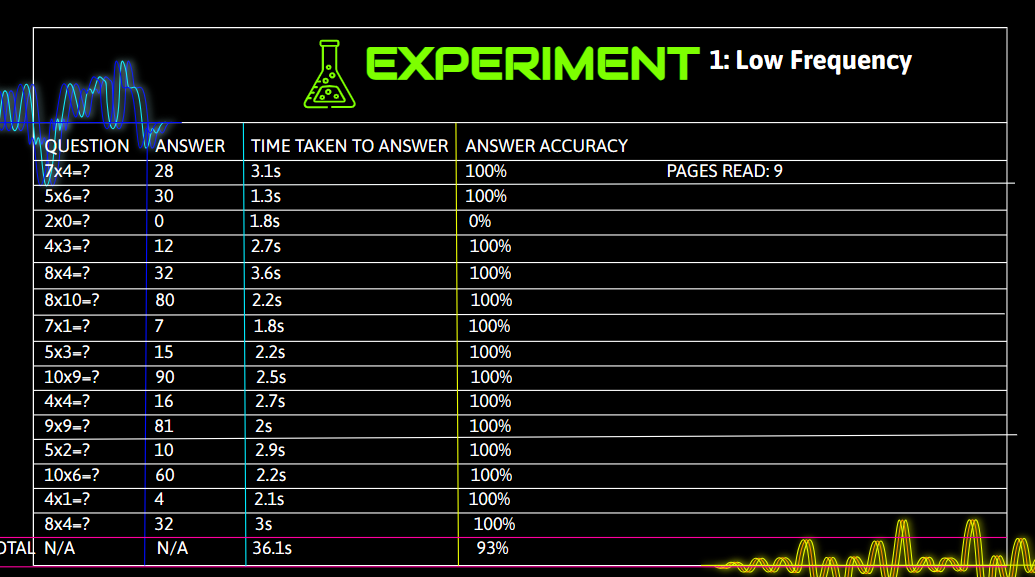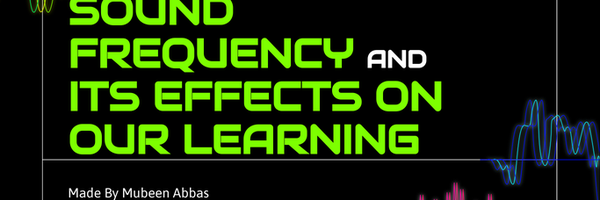Sound Frequency and Its Effects on Our Learning
Grade 8
Presentation
No video provided
Hypothesis
I hypothesize that the higher the sound frequency is, the more we are able to learn or focus and the lower the sound frequency is, the lower the capability of learning or focusing will be. Because the higher frequency will block out any noise or distractions and the high frequency itself is steady, the HZ not going lower or higher!
Research
Sound frequency are the number of sound waves in every second, the lower amount of sound waves the lower the sound but the higher amount of sound waves the higher the sound is!
Sound frequency are measured in hertz(HZ), so if every second there are 87 sound waves that would mean the source of the sound is producing it at 87 HZ.
Sound frequency are used in sonar which is a method that uses sound frequencies to communicate or locate things depending on the situation.
Variables
The controlled variables are the amount of math questions addition with multiplication only, amount of minutes spent reading, the book, the time spent listening before to the frequency and the headphones. The manipulated variable is sound frequency and the responding variable is the time plus accuracy of answering the math equations and the amount of pages read within 15 minutes.
The procedure of my experiment is too first listen to a low frequency which is 400 Hz for 10 minutes at 24 volume, then after whilst having the headphones i will solve 15 multiplication equations timing my accuracy and speed of solving each equation and lastly i will read for 15 minutes seeing at the end how much pages I read. I will the do this exact same thing with a medium 900 Hz frequency and a high 2000 Hz frequency all at 24 volume.
Procedure
The procedure of my experiment is too first listen to a low frequency which is 400 Hz for 10 minutes at 24 volume, then after whilst having the headphones i will solve 15 multiplication equations timing my accuracy and speed of solving each equation and lastly i will read for 15 minutes seeing at the end how much pages I have read. I will the do this exact same thing with a medium 900 Hz frequency and a high 2000 Hz frequency all at 24 volume.
Observations



Analysis
The results of the experiments surprised me showing that the lowest frequency had a 93% answer accuracy which was a score shared with the medium frequency and a 36.1 second answer time which out of the 3 frequencies was the slowest and 9 pages read also being the worst out of the 3 frequencies. The medium frequency however did quite well with the best time of 31.8 seconds and a accuracy of 93% which was not quite good but prevailed in the page amount of 9 and a half. The last frequency which is high was a bit better then the medium frequency with 34.9 second answer tiem, a 100% accuracy which was the best score and with the frequency i was able to read 10 pages of The Giver. Some notes about this experiment was how whilst having the headphones in i felt constant nausea with didn't dissipate but stayed and a head which also never dissipated whilst wearing the headphones
Conclusion
The conclusion of my experiment shows that my hypothesis was semi-correct how the high frequency will help us learn more, it does show us that low frequencies tend to not help us which I speculate is due to how subtle it is hearing the frequency, like a fly next to your ear. the medium and high frequencies prevail in certain fields that the other frequency doesn't, like how the medium frequency had i higher answer speed then the high frequency but the high frequency had a better answer acuray. showing that if we were to experiment more with this topic then we would possibly make revolutionary changes to learning!
Application
The findings of my science fair project can be applied in the real world in a few ways like maximizing how much we are able to learn, by playing a certain frequency or more preferable a range of frequencies like in a nasheed (islamic sort of music) that target the maximum output and use of someone's knowledge, another way my findings of a high and medium frequencies helping us is with relaxation to ease the stress off a person's mind which in a adults life would be most beneficial to their mental health!
Sources Of Error
A few errors in my experiment that i would change next time if i did this experiment every again is, having multiple people to test because from person to person results would vary and 1 person only doing an experiment like how i did leads to a likely possibility of misinformation and results which would not help anyone, another error i made in my experiment is not spacing the experiments out more from day to day but instead I tested the 3 frequencies back to back which would explain how the lower the frequencies were the worst they got. The last error i made in my experiment was not testing other subjects to get more diverse and useful results, i only tested math and literature, which yes the 2 are very important but don't cover the whole spectrum of learning.
Citations
- Sound Waves! - Fun Kids - the UK’s children’s radio station. (2023). Fun Kids - the UK’s Children’s Radio Station. https://www.funkidslive.com/learn/waves/sound-waves/
- Thesaurus.com - The world’s favorite online thesaurus! (2024, March 12). Thesaurus.com. https://www.thesaurus.com
- Sauce, S. (2018). Sound: Wavelength, Frequency and Amplitude. [YouTube Video]. In YouTube. https://www.youtube.com/watch?v=TsQL-sXZOLc
- Free Google Slides themes and Powerpoint templates | Slidesgo. (2024). Slidesgo.com. https://slidesgo.com/
- Beaver, K. (2023, January 17). How to Treat Difference Frequencies of Sound. Soundproof Cow. https://www.soundproofcow.com/difference-high-middle-low-frequency-noise/
- Online Stopwatch - easy to use. (2024). Timeanddate.com. https://www.timeanddate.com/stopwatch/
- Hall, J. (2024). Maths Question Generator. Mathsbot.com. https://mathsbot.com/questionGenerator?id0=3&min0=0&max0=1&id1=0&min1=0&max1=10&id2=0&min2=0&max2=10&id3=0&min3=0&max3=10
- The. (2019). The Giver - Text.pdf. Google Docs. https://drive.google.com/file/d/0B2ZnbS0uiOcON1QxSF9YN1FiWkU/view?resourcekey=0-zgsgjOBfJmP16lDoVEXWHg
Acknowledgement
There are a few people I would like to acknowledge, those people are Jyothi Nambiar, my grade 8 homeroom teacher, a high school teacher named Ghada Aly and my neighbor Nischay Aujola. These people helped me and reviewed my project.

